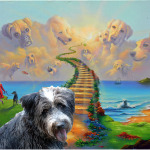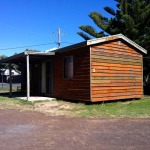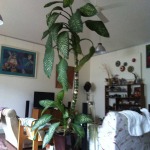 Where do they go, when the factories close? A few years ago I heard a podcast from Planet Money about what middle-aged American men did once they were laid off from their jobs. A large number, it seems, went on disability support.
Where do they go, when the factories close? A few years ago I heard a podcast from Planet Money about what middle-aged American men did once they were laid off from their jobs. A large number, it seems, went on disability support.
As manufacturing moved out of the United States, its workers moved on to disability. They had back pain, high blood pressure, diabetes. They had enough misery in their lives to qualify for disability pensions. Which was fortunate, in a way, because they had precious little chance of ever finding work again.
Maybe a higher percentage than usual of these guys set down their remote controls the other day and hoisted themselves out of the house for the trip down to the local polling booth.
The revolt of the cast-offs of globalisation isn’t the only explanation for Trump – I think it was part of a perfect storm of other factors, which I’ll get into further down – but it’s the factor that so few pundits took into account prior to election day. This is strange, because Brexit should surely have been a warning.
I was in the UK as Brexit unfolded. I was hanging around inside my own echo chamber, visiting certain parts of London then Oxford and Cheltenham. There were Remain signs in windows. It seemed a foregone conclusion that the UK wouldn’t be so silly as to dump the EU. And then the morning after. What the hell happened? The thing that happened was well out sight – for us. The thing that happened was that people who were not doing so well out of globalised capitalism – people not so visible in public life – went out and voted. In the case of Brexit and Trump, it was a generalised flipping of the bird. It was an emotional reaction, a final had-enough-and-not-taking-it-any-more. Turkeys voting for Christmas? Perhaps. But these are people who feel that Christmas has already been and gone. Their gnawed bones are being scraped into the garbage bin. (Note: Feelings are not the same as facts; they might or might not be justified.)
And then the racism on the streets. People who had lived in the UK for decades or even generations being told to go “home”. All because the demagogues, given oxygen by Murdoch and other scurrilous press, held up a scapegoat for discontent: The Other.
So when my partner Steve said on Wednesday morning that Clinton would probably win, I said I’m not too sure. Remember Brexit. He said she was ahead in most of the polls. Still, I wasn’t too sure.
As Wednesday afternoon wore on, I kept taking a moment out of my video editing job (a weekend of celebrations for the 150th anniversary of the birth of Grenfell) to look at the latest news on ABC News 24. I saw a weird dial that said it was 80 per cent likely that Trump would win the presidency. And even I, who only that morning had said it was possible, was shocked. Here’s a candidate off the edge of the scale. Here’s a genuine fascist, no exaggeration necessary. What were the German fascists all about? Creating a simple scapegoat for complex problems. Promising to restore the country to former greatness. It was about a word I first learned in Mr Corson’s History class: autarky. Autarky means self-sufficiency. It means you don’t rely on the rest of the world for your essentials; you make them yourself. I remember learning by heart for my final exams a whole table showing the increase in pig iron production prior to the second world war. Trump has been telling people he’d stop free trade, support home-grown manufacturing, revive those rusting, weed-infested factories. Build a wall against Mexicans. Put women back where they belong. Laugh at climate change. Make America a man again.
How could people be so stupid?
I mean, how could we be stupid as to think that you can make people feel so miserable, insecure, powerless and overwhelmed by change without consequence? Why should they keep voting for business as usual? (And Hilary Clinton, despite being a woman, was clearly seen as business as usual.) The documentary maker Michael Moore has been trying to tell us about this for a long time. He was one of the few in public life that predicted Trump’s win.
So. I’m writing this from Bathurst, New South Wales, where we have a yearly celebration of working class culture in the V8 car races. We have a manufacturing industry but it’s in decline. This used to be a railway town. Until just a few years ago we even made our own bogies at Downer EDI. The last one rolled off the production line in 2013. Our friend Glen, who used to work in the EDI factory had seen it coming. For years he painstakingly worked through a teaching degree by distance education, working on essays into the night, bundying on at the factory early the next morning. After the factory closed, he was eventually able to find a job as tech teacher at the local high school. Glen managed to make the transition, but he had unusual foresight and adaptability. Where are his fellow workers, now? I would not be surprised to find a few on the disability pension.
Further west, in Cowra, there used to be a fruit and vegetable processing factory. I filmed it for a client-based video called What Employers Want. At that factory there were toolmakers who knew how to create the machines and tweak the production lines that filled and sealed the cans of peas and asparagus. It was an old factory, with parts of it looking like something out of a 1950s film set, but there was also a shiny new addition glinting in the sun, the result of a life-saving government grant. But it died anyway. Where are those blokes, now, the ones who knew how to tweak the machines? What about the young apprentice in the video? Has he been able to find other work?
I’m not saying this is the only explanation for Trump. No doubt misogyny and racism are real and powerful all by themselves. With the collapse of traditional media people are retreating to their own silos, occupying parallel universes in the same geographical spaces. Reality television means people can get to know and like provocateurs like Trump (and Pauline Hanson over here), giving them 100 per cent brand recognition that can be easily parlayed into electoral success. And the chickens are coming in to roost on dog whistle politics, to mix my farmyard metaphors.
It’s been a perfect storm, but not one that hasn’t been brewing for a long time. It’s a storm made of a backlash against feminism, LBQTI rights and rainbow politics, the rise of the evangelical Christian right (which mobilised for Trump), a domineering foreign policy answered by terrorism followed by war followed by body bags and a disinclination to support Clinton’s promise of continued hawkishness, a backlash against the bankers who caused and then were bailed out of the global financial crisis, the decline of the old colonial powers of the English speaking world and Europe and the rise of Asia, a preference for a Norman Rockwell past over an apocalyptic, climate-changed future and, perhaps most of all, simple refusal. Half of eligible voters didn’t vote. They didn’t have the heart. They didn’t think it was worth it.
I’m writing this partly because the US is inherently interesting to me – we’re permanently saturated in American culture so it’s hard not to get interested – but also because the parallels with our own situation here are obvious. Whatever storms are brewing there are brewing here, too.
How do we deal with it?
On Thursday morning, once it was definite that Trump was the Leader of the Free World, I was struck by a thorough-going ennui. I’ve been politically active, one way or another, for most of my adult life. But on Thursday I toyed with not bothering any more. I’ve been ill. I could retire to my PhD and spring garden. But I also had to write this week’s BCCAN column and in writing it, I wrote myself back into my tiny bit-part in political life. People have fought fascism before; they’ll do it again. By the afternoon, anti-Trump high school students in California had taken to the streets.
So I will continue on as President of BCCAN, a thing I can do on my own territory that is at odds with all Trump stands for. In campaigning for action on climate change, I’m ever-conscious of the Lithgow coal miners (and ex-coal miners) just half an hour down the road. Many hate “greenies” with a passion, blaming us for the winding down of coal and the loss not just of their livelihoods but of the story of who they are. I don’t know quite what to do about these miners, but I do know they’re important. They can’t be left out of account. Somehow we need to form an alliance, or try to at least. We need to try to do what alliances have always done, which is: accept that we don’t agree on everything. Accept that perhaps we don’t agree on much at all. But if we agree on something, and that something is important enough to fight for (jobs in renewables?), then let’s see what we can do together.
It’s not easy, though. I recall a movie I saw recently. Actually I saw it with my friend Larissa in Newtown after getting back from the UK (yup, burned carbon all the way there and back). It was Pride (2014) about the alliance between striking Welsh coal miners and lesbian and gay activists (the BTQI part wasn’t such a thing in the early 1980s) from the time when Thatcher tried to close down the pits (climate change wasn’t such a thing then, either). The gay and lesbian activists insisted on supporting the striking miners, despite comical differences in lifestyles and attitudes. The last scene depicts a historic gay pride march held in London in the early days of the AIDS epidemic. Impossibly, incredibly, it was led by a band of Welsh coalminers: they were supporting their allies at a time of need.
It’s a beautiful piece of history. It shows what can be done. But then I thought about the thirty years since then. There is still hatred for LBGTI people. But marriage equality exists in the UK, and LBGTI people have made many gains over the past three decades. The Welsh miners? They lost. And they voted Brexit.





